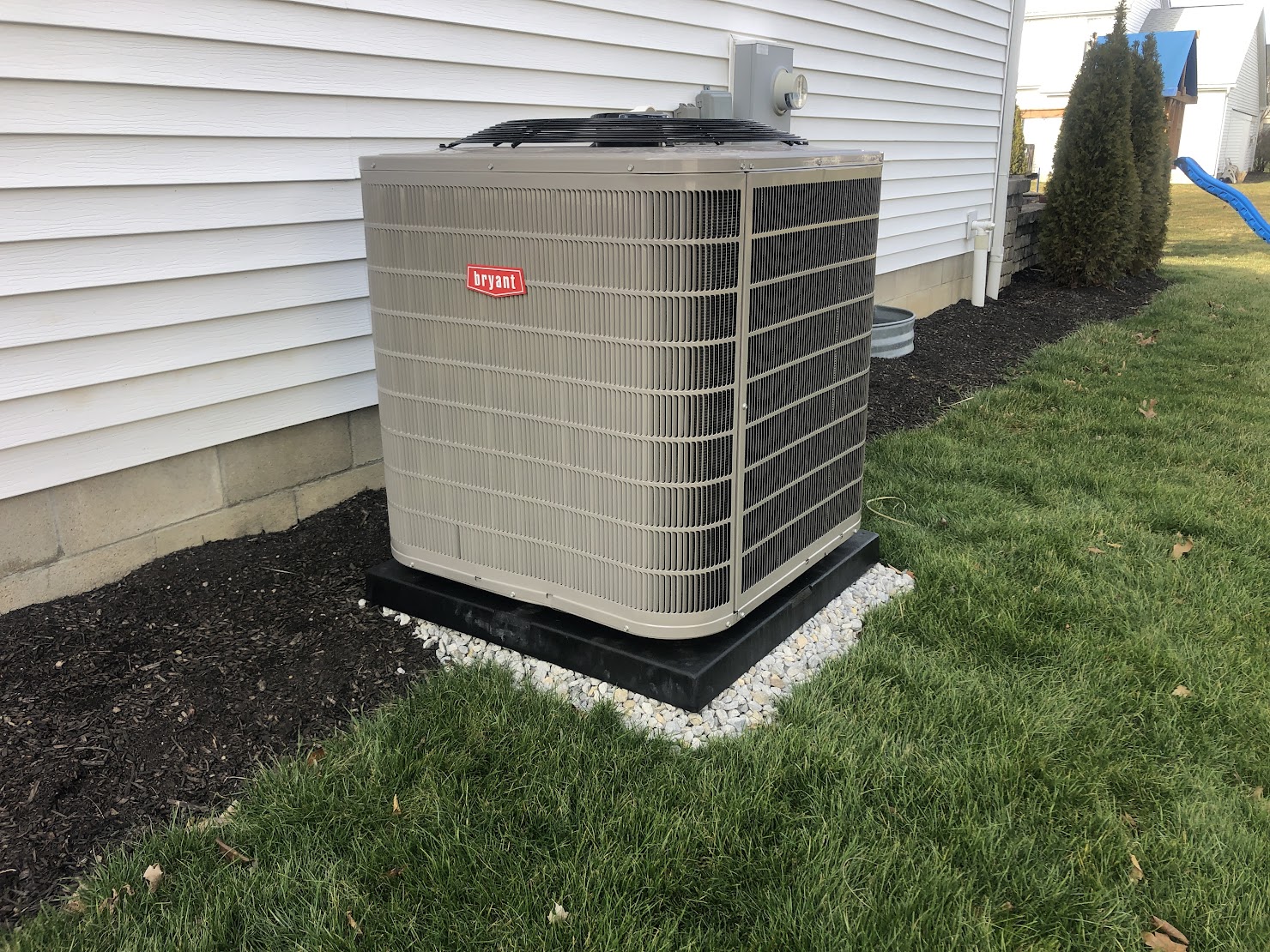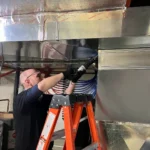Central air conditioning is more than a modern convenience—it’s a transformative solution for achieving consistent comfort in your home, regardless of the season. From uniform cooling to boosting your property’s value, central air systems deliver unmatched benefits, making them a go-to choice for discerning homeowners. But how does this marvel of engineering actually work, and what sets it apart from other cooling systems? Let’s dive into the essentials and uncover why central air conditioning is a top-tier choice.
What Is Central Air Conditioning?
Central air conditioning is a system designed to cool your entire home or building through a network of ducts and vents. Unlike window units or portable air conditioners that target specific areas, central air ensures a uniform temperature across all rooms, creating a seamless cooling experience.
The system operates using a split design, which consists of two key components
- Outdoor Unit:
- This unit contains the compressor and condenser coils, which work to release heat from the indoor air into the external environment.
- Indoor Unit:
- Housed within the home, the indoor unit includes evaporator coils and a blower fan, which absorb heat from the indoor air and push cooled air into your living spaces.
These components are connected by refrigerant lines and work together to maintain your home’s desired temperature, ensuring comfort even on the hottest days.
How Does Central Air Conditioning Work?
Central air conditioning operates on a straightforward but ingenious principle: heat transfer. The system doesn’t create cool air; instead, it removes heat from indoor air and expels it outside.
Here’s a step-by-step breakdown of how it works
1. Thermostat Activation
The process begins when the thermostat detects that indoor temperatures exceed the preset level. It sends a signal to the air conditioning system to start cooling.
2. Heat Absorption
Warm indoor air is drawn into the system through return vents. This air passes over the evaporator coils, where the refrigerant absorbs heat, cooling the air.
3. Heat Transfer Outdoors
The refrigerant, now carrying the absorbed heat, flows to the outdoor unit, where the compressor pressurizes it. The heat is released into the outdoor environment via the condenser coils.
4. Cool Air Distribution
The blower fan pushes the now-cooled air through the ductwork, delivering it evenly across all rooms through supply vents.
5. Cycle Repeats
This process continues until the thermostat senses that the desired indoor temperature has been reached.
Benefits of Central Air Conditioning
Central air conditioning offers far more than a reprieve from the heat. It delivers numerous advantages that improve your quality of life and the functionality of your home.
1. Uniform Cooling
Forget about battling hot spots in one room and chilly drafts in another. Central air ensures consistent temperatures across your entire home, creating a balanced and comfortable environment.
2. Enhanced Air Quality
Many central air systems include advanced filtration systems that remove allergens, dust, and pollutants from the air. This not only cools your home but also promotes healthier indoor living conditions.
3. Energy Efficiency
Modern systems are built with energy efficiency in mind. Features like programmable thermostats and zoning options allow you to cool only specific areas, reducing energy waste and lowering utility bills.
4. Quiet Operation
Unlike noisy window units or portable ACs, central air operates with minimal indoor noise. Most sound-producing components, such as the compressor, are housed outside, keeping your indoor spaces tranquil.
5. Increased Home Value
A home equipped with central air conditioning is a highly attractive prospect for buyers. This system not only enhances comfort but also boosts the property’s market appeal, making it a wise investment.
6. Space-Saving Design
With central air, there’s no need for bulky window units or portable devices cluttering your living spaces. The system is discreetly installed, preserving the aesthetic integrity of your home.
Central Air Conditioning vs. Other Cooling Systems
To truly appreciate the advantages of central air, it’s worth comparing it to other cooling options
Window Units
- Pros: Inexpensive upfront costs, easy to install.
- Cons: Noisy, limited cooling capacity, and they block natural light.
Ductless Mini-Splits
- Pros: Zoned cooling and no need for ductwork.
- Cons: Higher initial costs, not ideal for large homes.
Portable AC Units
- Pros: Mobility and flexibility for small spaces.
- Cons: Limited efficiency, require venting, and take up floor space.
In contrast, central air conditioning offers a superior balance of efficiency, comprehensive cooling, and unobtrusive design, making it an excellent long-term solution.
Is Central Air Conditioning Right for Your Home?
Choosing the right cooling system involves assessing several factors unique to your home and lifestyle. Here’s what to consider
1. Ductwork Availability
If your home already has ductwork, installing central air is more straightforward and cost-effective. Homes without ducts can still install central air, but the process involves higher upfront costs for duct installation.
2. Climate Needs
Central air conditioning is ideal for areas with long, hot summers where consistent and reliable cooling is essential.
3. Budget Considerations
While central air has higher initial installation costs compared to portable or window units, its efficiency leads to significant savings on energy bills over time.
4. Future Plans
If you plan to sell your home, central air can significantly enhance its resale value and attract more buyers.
Maintenance Tips for Central Air Conditioning
Proper maintenance is the key to keeping your central air system running efficiently for years. Here are some practical tips
1. Change Air Filters Regularly
Replace air filters every 1–3 months to ensure proper airflow and prevent the buildup of dust and allergens.
2. Schedule Professional Tune-Ups
Annual inspections by an HVAC technician can identify potential issues before they escalate into costly repairs.
3. Clean the Outdoor Unit
Remove debris like leaves and dirt from the outdoor unit to ensure optimal heat dissipation.
4. Seal and Insulate Ductwork
Check for leaks in the ductwork and seal them to improve efficiency and prevent energy loss.
5. Test Thermostat Functionality
Ensure your thermostat is calibrated correctly and consider upgrading to a programmable model for enhanced control.
Frequently Asked Questions About Central Air Conditioning
1. How much does central air conditioning cost to install?
Installation costs typically range from $3,000 to $7,000, depending on the size of your home and whether ductwork is already in place.
2. How long does a central air system last?
With proper maintenance, central air systems can last 15–20 years.
3. Does central air conditioning dehumidify the air?
Yes, central air systems naturally reduce humidity levels while cooling, creating a more comfortable indoor environment.
4. Can central air work in older homes?
Yes, though installing ductwork in older homes can be more complex and may require additional modifications.
5. Is central air conditioning energy-efficient?
Modern systems with high SEER (Seasonal Energy Efficiency Ratio) ratings are designed to maximize efficiency and minimize energy consumption.
Central air conditioning is more than a cooling system—it’s a comprehensive solution for enhancing your home’s comfort, air quality, and value. By understanding how it works, its benefits, and how to maintain it, you can make an informed decision about whether it’s the right choice for your needs. With proper care, a central air system will keep your home cool, efficient, and comfortable for years, making it a worthwhile investment for any homeowner.







